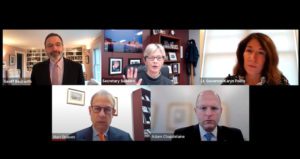Who is a member?
Our members are the local governments of Massachusetts and their elected and appointed leadership.

The administration held a special pre-announcement briefing for local officials today. Pictured are (top row, l-r) MMA Executive Director Geoff Beckwith; Health and Human Services Secretary Marylou Sudders; Lt. Gov. Karyn Polito; (bottom row, l-r) MAPC Executive Director Marc Draisen and MMA President and Arlington Town Manager Adam Chapdelaine.
In the midst of holiday season gatherings and an emerging coronavirus variant, the Baker-Polito administration is making 2.1 million at-home test kits available for free to 102 targeted high-need communities.
The administration is also negotiating contracts with manufacturers to make lower-cost kits available to all municipalities. The cost of these tests would be a reimbursable expense under Federal Emergency Management Agency pandemic response aid or the American Rescue Plan Act.
The four-step, at-home rapid antigen tests are non-invasive and produce reliable results in 15 minutes, according to Health and Human Services Secretary Marylou Sudders. The over-the-counter tests enable residents to catch COVID cases before the disease can spread at gatherings. A test kit, which contains two tests, costs anywhere from $12 to $38 at stores, pharmacies and online retailers, and the administration has been urging federal officials for several months to do more to bring down the cost of COVID tests, which are widely available in Europe for a nominal cost.
The state is purchasing 2.1 million tests directly from a California manufacturer and will distribute them to 102 communities that were selected based on the percentage of their population with incomes below the poverty line. Sudders said the 102 communities account for 3.7 million residents, slightly more than half of the state’s population.
The first 400,000 tests are due to arrive Friday, Sudders said, while the remainder are “en route.” These free tests will be available for distribution to the public by each municipality, with an emphasis on increasing access for individuals and families who are facing financial hardship.
Sudders said local health departments and boards of health in the 102 selected communities were due to receive an email at 9 a.m. with all the necessary details, including the number of tests they will receive, as well as a survey that is due back by 5 p.m. tomorrow. The Executive Office of Health and Human Services has set up a website to provide information about the program.
Meanwhile, Sudders said, the state is negotiating “with as many manufacturers as possible” to “drive test costs down as much as possible.” She said municipalities will be able to purchase tests next month at the state-contracted rate through the CommBuys procurement website. She said the state will be negotiating supply contracts on a rolling basis going forward. In the coming weeks, the administration will provide details about how municipalities and other public entities can procure these tests.
Residents who can afford to do so are advised to visit local pharmacies or online retailers to purchase rapid test kits on their own, as needed.
Massachusetts performs more COVID tests than almost any other state in the country thanks to the hundreds of existing testing locations across the Commonwealth, including 38 free state sponsored Stop the Spread testing sites. Residents can continue to access these COVID testing sites during the holidays. All testing sites are listed at mass.gov/gettested.
The administration scheduled an official announcement of the new testing program for 10 a.m. today, but held a special pre-announcement briefing for local officials at 8 a.m. Lt. Gov. Karyn Polito joined Sudders for the briefing, which was coordinated by the MMA and co-sponsored by the Metropolitan Area Planning Council. MMA Executive Director Geoff Beckwith, who facilitated the session, was joined by MMA President and Arlington Town Manager Adam Chapdelaine, and MAPC Executive Director Marc Draisen.
The nearly 100 local officials on the call expressed their appreciation for the administration’s efforts on testing.
At-home tests can be completed in 15 minutes without the need to send a sample to a laboratory. A mobile device or computer is not needed for any part of the test, which can be taken by anyone over the age of 2, regardless of vaccination status or whether they have symptoms. The tests do not automatically report results to any government agency. Those who test positive are advised to contract their primary care physician and the local board of health and follow COVID-positive protocols.
Last week, the U.S. Centers for Disease Control and Prevention issued guidance on self-tests, with information on when to consider self-testing, how to complete the tests, and how to react to a positive or negative result.
The following are the 102 communities that will receive free test kits:
A-E
Adams, Amherst, Athol, Attleboro, Avon, Barnstable, Bernardston, Beverly, Boston, Bridgewater, Brockton, Brookline, Buckland, Cambridge, Charlemont, Chelsea, Chicopee, Chilmark, Clarksburg, Colrain, Dennis, Eastham, Erving, Everett
F-L
Fall River, Fitchburg, Florida, Framingham, Gardner, Gloucester, Granville, Great Barrington, Greenfield, Halifax, Hamilton, Haverhill, Hawley, Heath, Hinsdale, Holyoke, Huntington, Lawrence, Leominster, Leyden, Lincoln, Lowell, Ludlow, Lynn
M-Q
Malden, Methuen, Middleborough, Milford, Millville, Monroe, Montague, Mount Washington, New Bedford, New Braintree, Newbury, North Adams, North Attleborough, Northampton, Norwood, Oak Bluffs, Orange, Orleans, Oxford, Palmer, Peabody, Peru, Pittsfield, Quincy
R-Z
Randolph, Revere, Rockland, Rockport, Russell, Salem, Saugus, Savoy, Somerville, South Hadley, Southbridge, Southwick, Springfield, Stoughton, Taunton, Uxbridge, Wales, Waltham, Ware, Wareham, Webster, Wendell, West Boylston, West Springfield, West Stockbridge, Weston, Williamstown, Winchendon, Winthrop, Worcester
• Audio of Dec. 13 call with administration (26M MP3)